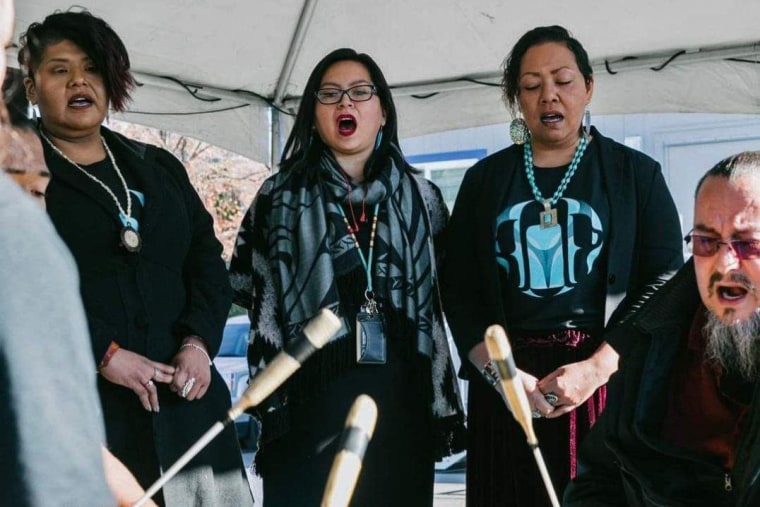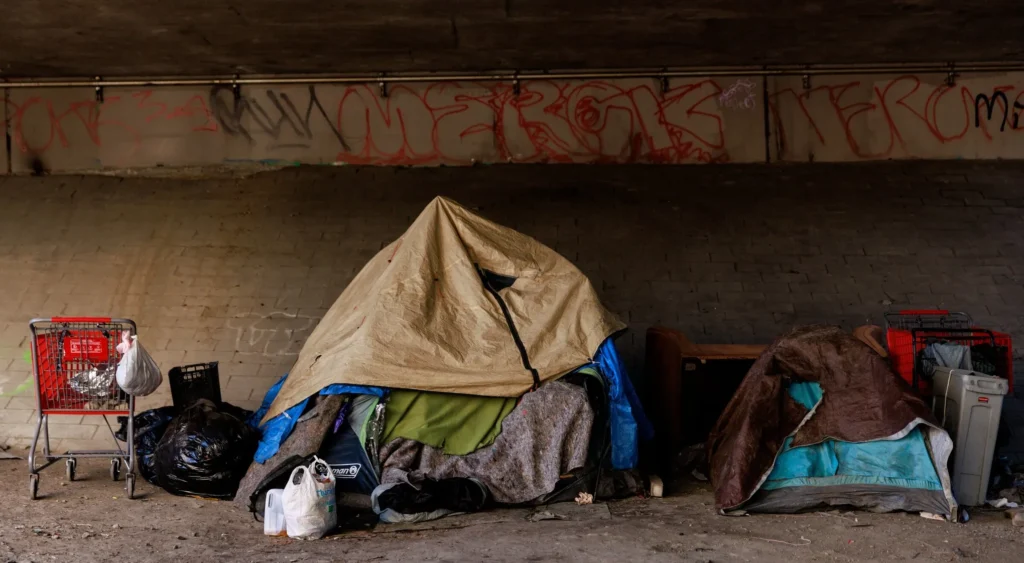King County Metro intends to use its Eagle Village property for parking after a special-use permit expires.
Homelessness in the U.S. is at a record high, according to new data released by the federal government this week. And as in previous years, Indigenous people are overrepresented among Americans experiencing homelessness.
Members of Chief Seattle Club, a nonprofit that serves Indigenous people in Seattle, are especially aware of what the homeless people in their community are up against. A 2019 permit granted by the transit authority King County Metro to turn a parking lot into Eagle Village, one of the homeless shelters managed by the nonprofit, is about to expire.
Now, there are fears that the shelter’s residents will once again face homelessness.
“They’re trying to entice people off of reservations into urban settings for a chance at prosperity, but it just ends up being a poverty trap,” Chief Seattle Club Executive Director Derrick Belgarde said.
Culturally specific homeless care
The U.S. Department of Housing and Urban Development released its annual homeless assessment report on Friday. Findings show that homelessness is at its highest reported level since the department began surveying in 2007. The number of people experiencing homelessness increased by 12% between 2022 and 2023.
Indigenous people continue to be “overrepresented” in the data, according to HUD. They had the largest percentage increase of people experiencing sheltered homelessness, rising 18% in one year. They make up about 3% of the 653,104 people tallied in the study as experiencing homelessness.
But in King County, where Seattle is located, the situation is especially dire. Anne Martens, senior director of communications at the King County Regional Homelessness Authority, said between 9% and 15% of the homeless population identifies as Native or Indigenous. Demographically, they constitute only 1% of the total population.
“There is a clear need to increase capacity and culturally-relevant services for Native/Indigenous people experiencing homelessness — that depends on funding, and on finding locations that will welcome shelter, housing, and supportive services,” she said.
Martens added that only 84 out of the county’s 5,369 shelter beds are culturally specific to Native people. Belgarde explained that culturally specific shelters are essential because of many Indigenous people’s mistrust in “non-Native systems.”
“When Natives find themselves in an urban city, they’re not going to reach out to the mainstream providers because there’s a mistrust. There’s a feeling that they’d be safer not accepting that help,” Belgarde said. “It takes a Native face to encourage another Native person to want to come indoors, and that’s what we provide.”
Chief Seattle Club specializes in addressing the disproportionately high number of single adults who experience homelessness chronically in the Indigenous community due to disenfranchisement, substance abuse and mental illness. The nonprofit manages permanent supportive housing units and shelters — including Raven Village, consisting of 22 tiny homes, and Eagle Village, housing 35 people at a time.
Both shelters filled up at “lightning speed,” according to Belgarde.
Now, Eagle Village is set to close at the end of March 2024.

Why Eagle Village needs an extension
Chase Gallagher, director of communications for the office of King County Executive Dow Constantine, said that King County Metro intends to use the property as parking for its fleet of nonrevenue vehicles. King County Metro is the government department responsible for public transportation in Seattle and King County.
The shelter was built on King County Metro property in 2019 with a special-use permit that was extended twice to coincide with the opening of Sacred Medicine House, a new permanent housing building with 120 units.
However, Belgarde said, there is a threat of Eagle Village residents being pushed back to the streets because of construction delays on the project, as well as the slow process of leasing compliance.
“There’s no way to stop people from going straight to the streets,” he said.
Chief Seattle Club “definitely” plans to ask for another extension to avoid this outcome, Belgarde said. He hopes that King County Metro can find an alternative to allow Eagle Village to remain until the organization can secure another shelter location: “If they’re looking for a parking lot, there are plenty of blank spots all around the area,” he said.
Though the organization manages other permanent housing projects, Belgarde emphasized the importance of Eagle Village because the shelter programming keeps people engaged with case managers, allows room checks and teaches necessary skills and community values.
He added that people who enter permanent housing units “fresh off the street” are more likely to become homeless again.
“When you put somebody who has been chronically homeless for years straight into a lease, they are more likely to fail or have issues because they don’t have certain life skills, such as tenant skills,” he said. “Having the chance to work with people, show them love and compassion, and build that community grounds them and gets them ready to be in a permanent unit.”
Gallagher said that King County is looking into other avenues to assist with securing an extension to the looming expiration in March 2024.
Source: NBC News


